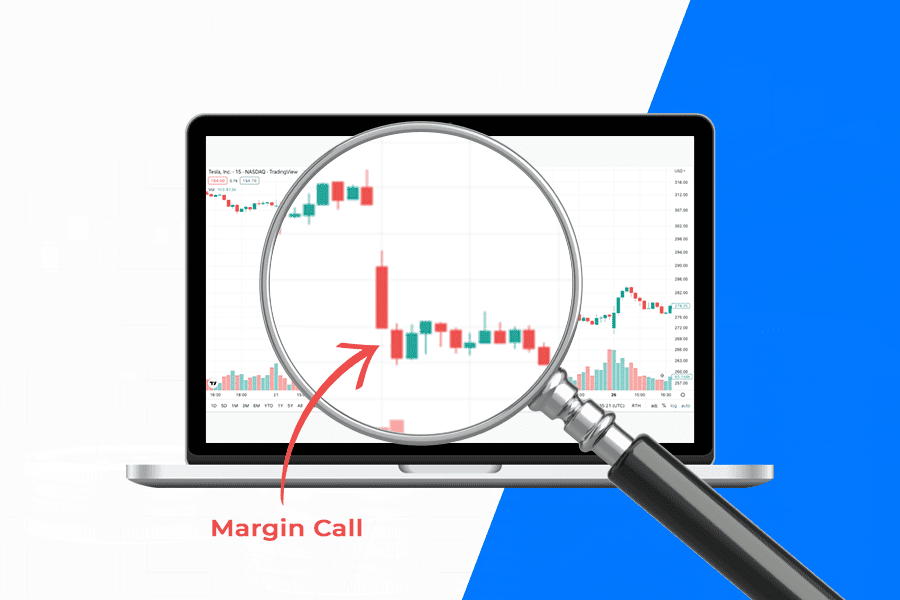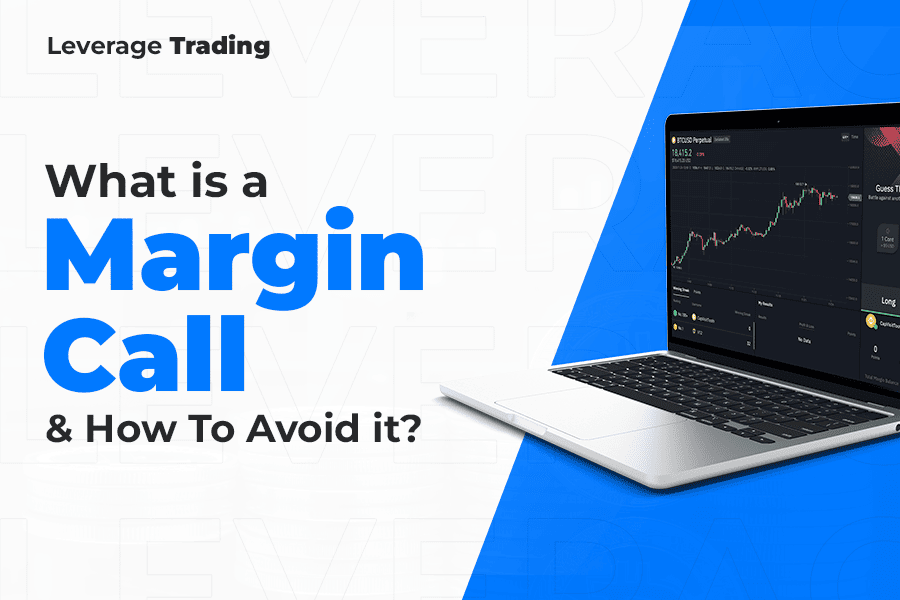Your leverage broker will send you a margin call when you are running low on margin requirements due to outsized losses during extended bear markets or simply from taking on too much leverage.
Margin calls are an important form of risk control that allows a broker to act quickly when a trader starts to lose too much money.
This is to prevent traders from liquidating their trading accounts and reduce the risk of loss for the broker, who has given them loans as trading capital.
It can be confusing, even for experienced traders, so you’ll want to know what a margin call is to protect yourself from being blindsided.
Without this security system, a lot of traders would lose money unwillingly to the left and right but something has seriously gone wrong with your trade if your broker sends you this warning.
Use our margin call calculator to help you calculate the exact margin call price of your current position.
Key takeaways
- A margin call is a message from a broker notifying a trader that he is running low on capital due to outsized losses.
- Margin calls happen when traders lose money and run the risk of getting liquidated.
- There are three ways to deal with a margin call: Close out the trade, deposit more funds, or do nothing. Closing out the trade is usually the safest bet.
Other helpful articles:
Margin call explained
A margin call is a demand for additional funds by your broker due to adverse price movements in your open positions.
Take a look at this example image of a downtrend in the Tesla stock where several leveraged traders got margin called.

If you do not have the required funds to support the total losses in your account, your broker may close out some or all of your positions to reduce the risk and meet the call.
In the same way that your bank asks you for a downpayment on your loan, a broker will ask for collateral to open leveraged positions. The difference however between a loan and a trade is that your trade can lose collateral value.
When this value falls below a certain safety threshold, your broker will send out this message to warn you that your account is close to getting liquidated.
Your losses are always paid for with the capital that you have deposited. This is why large losses can cause your trading account to temporarily enter a high-risk environment if most of your margin capital is being used and there is no room for losses.
If you do receive a margin call, you will usually have a few days to meet the demand.
This of course depends on how the market behaves. Should the market keep going against your trade, you might only have a few hours or minutes to take action.
If you are not able to give your account more breathing room, your broker may close out some or all of your positions.
While this can be an uncomfortable experience, it is important to remember that it is designed to protect both you and your broker from excessive losses.
What triggers a margin call?
These are the most common reasons that trigger this warning signal.
- An investor takes on too much risk and the market goes against him to the extent that the account is put in jeopardy.
- A trader opens several positions at the same time without checking the margin requirement.
- One position alone uses up all the deposited money leaving no room for the market to move.
When you trade with leverage, you are essentially borrowing money from your broker to afford larger positions. To borrow the money you need to make a deposit first.
Margin is the minimum amount of money that must be in your account to keep your position open.
If the value of your trade falls and drops below the requirement it will trigger a warning signal from your broker asking you to deposit more money into your account to meet the minimum requirement.
This is simply a demand for more money to be paid into the account to maintain the margin requirement ratio at an acceptable level.
All leverage brokers have different ratios at which they allow the investor to use the borrowed funds. Some trading platforms have a very low threshold which allows for more risk while others are more conservative.
6 effective ways to avoid it
Here are six ways to avoid a margin call:
- Monitor your account regularly – Keep an eye on both the value of your investments and how much is left of your balance. If either starts to decrease rapidly, take action to reduce your exposure.
- Stay within your risk limits – Don’t make up for losses by taking on more risk and increasing the position size. Doing so will only increase the likelihood of a warning down the road.
- Use stop-loss orders – A stop-loss order is an order to sell a security once it reaches a certain price. This can help limit your losses in a falling market.
- Diversify your portfolio – By investing in a variety of asset classes, you’ll be less likely to experience severe losses in any one area.
- Use the correct leverage ratio – Make sure that you use the proper leverage ratio before opening the position.
- Use isolated margin for crypto – In crypto margin trading you must limit your exposure to one single position by activating the isolated margin function when choosing between cross and isolated margin.
How to handle one if you get caught off guard
If you get a margin call, there are a couple of ways you can act.
- The first thing you should do is assess the situation. If the market is truly moving against you and you don’t think that it will turn around soon, then it might be best to close out some or all of your positions. This will help limit your losses and avoid having to deposit more money into your account. It might seem difficult at the time but it is generally the better outcome.
- If you think that the market is just going through a temporary dip and will eventually recover, then you may want to consider depositing more money into your account. This will allow you to keep your positions open and potentially profit from the eventual market rebound. However, this should only be done if you are certain that the market can recover and that you can afford to lose the margin capital.
- The third and probably the worst option is to wait things out. By not doing anything you essentially put the faith in the market which is usually not very forgiving.
Whichever route you decide to take, make sure that you act quickly. The longer you wait, the greater the chance that the markets will move further against you and cause even more damage to your account equity.
An example of a typical situation
A margin call typically happens when an investor has bought securities with borrowed money and the value of those securities has fallen below a certain percentage of the original purchase price.
For example, let’s say an investor buys $10,000 worth of XYZ Company stock. The initial margin requirement is 50%, so the investor only needs to put down $5,000 of their own money and borrow the remaining $5,000 from their broker.
If the stock price falls below 50% of the original purchase price ($10,000), then the investor will receive a warning signal from their broker demanding that they deposit more money into their account.
If the investor does not meet this demand, then their broker may sell some or all of the securities in their account to cover the shortfall.
Another real-world example of a margin call in forex would be if a trader had an account with a leverage of 50:1 and opened a position worth $100,000.
To maintain their position open, they would need to have at least $2,000 in their account as collateral.
However, let’s say that the market moves against the trader and their account capital falls to $500. The broker would then warn the trader, asking him to either deposit more money or close out their position to save the account.
If the trader did not take either of these actions, then the broker would be forced to liquidate the position to prevent the trader from going into debt.
At what percentage do you get a margin called?
Typically, a broker will give you a warning when your account equity falls below a certain percentage of the total value of your leveraged positions.
The percentage at which you will receive a margin call varies from broker to broker. It can be anywhere between 2% to 50% depending on what type of trading platform you are using.
Leverage stock brokers tend to have stricter requirements of up to 50% while many forex brokers with high leverage might only ask for a 2% collateral ratio.
For example, at a 50% requirement, if you have $1,000 in your account and are using leverage, you would receive a warning if the value of your collateral fell below $500.
It’s also worth mentioning that you can get margin called if you have leftover capital in your account and you decide to open a second position with the remaining capital.
This would automatically flag you since you have no money left to cover any losses. Most leverage brokers will have systems in place to prevent you from using all your margin but still, some platforms will allow it.
What happens if you do nothing?
When faced with a margin call, your first instinct may be to ignore it out of fear.
Unfortunately, ignoring itcan have serious consequences.
When you receive the warning, it means that your broker thinks you are not able to meet the minimum requirements for the amount of money you have borrowed and that you have taken on too much risk.
If you ignore the warning, your broker may close out some or all of your positions to bring your account back up to the required level.
This could cause you to lose money on the trade.
It’s important to remember that a margin call is not a demand for payment – it’s simply a notification from your broker that you need to add more money to your account.
In severe cases, you may even be banned from trading altogether if you don’t act responsibly.
It’s important to remember that your capital is in place to protect both the broker and the trader, so it’s in everyone’s best interest to adhere to them.
Conclusion
The purpose of a margin call is to protect the broker against losses and to protect the investor from liquidation.
Some customers may view this as unfair, but it is important to remember that the broker is acting in their own best interests and if you compare it to a worst-case scenario where you get put in debt for outsized losses, it merely seems like a friendly reminder.
If you are receiving margin calls frequently, it may be time to reconsider your trading strategy for leveraged contracts.
You may be taking on too much risk, or your stop losses may not be adequate.
Remember, a warning is not necessarily a bad thing, but it should not be happening frequently if you want to be successful in trading.

